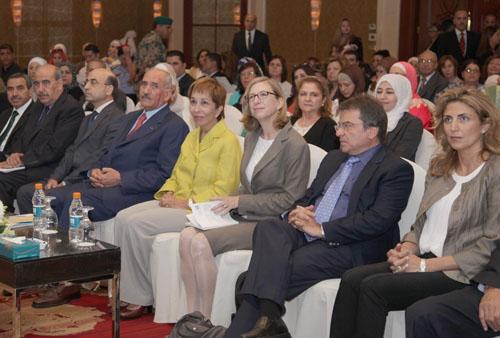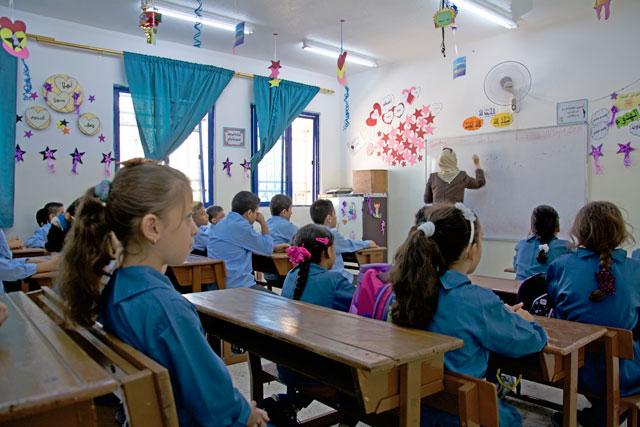You are here
Women in private education paid 40% less than men — study
By Laila Azzeh - Oct 07,2015 - Last updated at Oct 07,2015

HRH Princess Basma attends a seminar on wage discrimination against women working in private schools in Amman on Tuesday (Petra photo)
AMMAN – Officials, lawmakers, educators and labour rights activities gathered on Tuesday to address the issue of unfair wages for private school teachers.
Injustices faced by female teachers in the sector were the focus of the seminar organised by the National Committee on Pay Equity (NCPE) in cooperation with the International Labour Organisation (ILO).
Attended by HRH Princess Basma, the event provided stakeholders with an opportunity to address the pressing issue of wage discrimination faced by Jordanian women in education, particularly in the private sector where 27 per cent receive less than the monthly minimum wage of JD190, according to the NCPE.
In addition to low salaries, teachers are expected to work extra hours for free and have been denied sick leaves, panelists noted.
The gender gap in relation to wages in the private education sector in Jordan is 41.6 per cent. The average monthly salary for a male teacher is JD435, while the average monthly salary for a female counterpart is JD254, according to the NCPE.
Education Minister Mohammad Thneibat remarked at the seminar that female teachers make up 85 per cent of the teaching staff at private schools.
The committee’s “Stand with Teachers” campaign that aims to tackle this issue has been adopted by the NCEP and is headed by the Labour Ministry and the Jordanian National Commission for Women, with support from the ILO.
Princess Basma congratulated the NCPE and teachers working to ensure the fair treatment of women, calling on national institutions to “listen and respond to the needs of women and men workers for a more productive Jordanian society”.
Nariman Shawaheen, who has been working in private schools for nearly two decades, is one of many teachers who has been subjected to “unfair” practices.
“I questioned my decision to leave home and go to work every day. The pressure I feel is tremendous, and I get nothing in return,” she said.
Shawaheen and her colleague were fired for taking part in Tuesday’s seminar, they said.
Minister Thneibat vowed to take action against the school in question. However, he simultaneously blamed teachers who suffer injustices for not filing complaints against their employers.
In contrast, Shawaheen noted that she and her colleagues had tried to take their complaints to the Education Ministry but were always hindered by bureaucratic procedures and were often referred to the Labour Ministry.
Labour Ministry Secretary General Hamada Abu Najmeh pointed out that the current law does not include penalties against those who choose to discriminate between their male and female employees.
“This gives the private sector leeway. We are working to amend the law and train specialised inspectors to carry out field visits to private schools,” he added, unveiling plans to launch a hotline designated to receive teachers’ complaints.
Mohammad Tarawneh, deputy director general at the Social Security Corporation (SSC), said the new corporation’s law is a “model”, but negative practices prevent many women from reaping its benefits.
He also criticised some private schools for terminating teachers’ contracts during the summer vacation, and depriving them of benefits stipulated in the Social Security Law, such as maternity leave.
Shauna Olney, ILO chief of gender, equality and diversity, commended the teachers on their determination and courage to stand up for their rights, stressing the ILO’s commitment to stand with them in their cause.
Related Articles
AMMAN — Members of the Stand Up with the Teacher Campaign on Sunday visited the Ministry of Education, calling for the government’s interfer
AMMAN — After enduring years of “flagrant” violations, private school educators will now enjoy better job security thanks to a new decision
AMMAN — The International Labour Organisation (ILO) on Friday commended Prime Minister Omar Razzaz´s government for “safeguarding the salari














